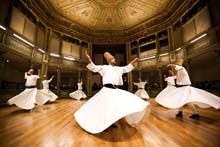Whirling Dervishes performance draws large audience

 An audience of more than 900 people came to the Visual and Performing Arts Center Theater Feb. 6 to see a company of Sufi Muslim performers known as the Whirling Dervishes of Rumi.
An audience of more than 900 people came to the Visual and Performing Arts Center Theater Feb. 6 to see a company of Sufi Muslim performers known as the Whirling Dervishes of Rumi.
In the audience was Steve McLinn of Edmond, who described himself as an artist and a musician. He said the Whirling Dervishes of Rumi were great the last time he attended their performance at another Oklahoma City area college, so he wanted to see them again.
McLinn said he felt a connection with the dervishes because it was a great mystical performance coming “from the heart.”
“That’s the path, and that’s the way to spin out of self,” McLinn said. The goal is to reach the Absolute Divine and thus purity.
“That’s the reason why I am drawn to them,” he said.
The organizer of the event, Ersin Demirci, praised the large crowd and promised them a joyful evening. He then explained Sufism and its grand master Rumi, a poet and mystic who lived in Konya, Turkey, around the 13th century.
Professor Dann J. May, of the Wimberly School of Religion at Oklahoma City University, explained the program of the evening which included a reading of poems by Rumi.
The poems were accompanied by a Turkish musical instrument called the “Ney,” which provided almost mournful sounds, and two other instruments called the “Kanun” and the “Saz,” played by three musicians dressed all in black , plus a lead singer.
May then gently eased the audience to the main event of the evening, the entrance of the dervishes, three men dressed in white gowns, tall brown Turkish hats, and black capes.
The dervishes slowly removed the black capes and walked toward the center of the stage with their arms crossed, hands softly touching their shoulders.
Under the musical sounds of the Ney, the Kanun, and the Saz, the dervishes started rotating in synchronized harmony at the center of the stage.
The dervishes accomplished four consecutive spiritual dances, where their necks became slightly bent, a sign that the ego is no longer involved.
In this posture they reach the status of a crystal clear human being ready to shine and spread love and an unconditional service to all beings without any discrimination, according to Sufi tradition.
Professor Lecturer Ori Z. Soltes, of Georgetown University, told the audience that “dervish” is an Arabic-Persian word meaning someone who follows the Sufi Muslim ascetic path. Sufism is a Muslim religious order known for having taken the vows of extreme poverty and austerity just as the “mendicant friars” did in Christianity, and also similar to Buddhist monks.
“We are proud to bring this significant cultural celebration all the way to Oklahoma City,” said Demirci, executive director of the Dialogue Institute of Oklahoma. The institute is an organization that promotes mutual understanding, respect and cooperation among people of diverse faiths, according to its website, www.dialogueok.org.
“The event was a big success,” Demirci said.
“The focus was on the shared values of humanity, rather than our differences, which help foster a deeper understanding and empathetic acceptance in central Oklahoma.”
The event concluded with the musicians performing one last epic song.
Afterward, the performers shared some moments with a few curious spectators who asked all sorts of questions which were gladly answered.
To contact Hicham Salim, email onlineeditor@occc.edu